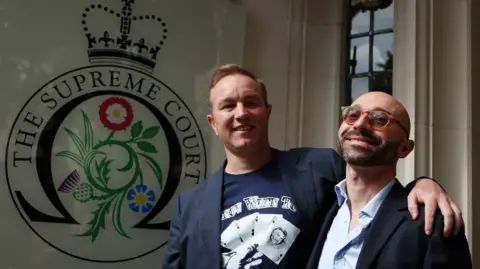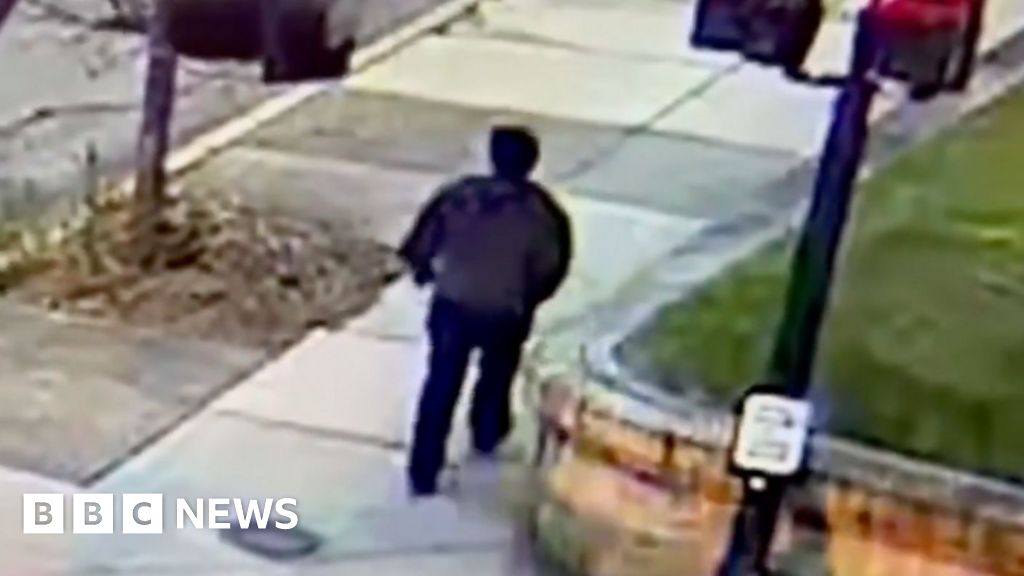Tom Espiner
BBC business reporter

 EPA
EPA
Tom Hayes and Carlo Palombo had their rate-rigging convictions overturned
Two former City traders, Tom Hayes and Carlo Palombo, have had their convictions for rate-rigging overturned by the UK's Supreme Court.
They were convicted and jailed for manipulating the interest rates used for loans between banks, which dictated borrowing costs for the likes of mortgages and car finance deals.
So what is rate-rigging and what happens next?
Why were the Tom Hayes and Carlo Palombo jailed?
Mr Hayes and Mr Palombo were among 37 City traders prosecuted for manipulating the rate benchmarks, Libor and Euribor.
These were used to track the cost of borrowing cash between banks and to set the interest rates on millions of mortgages and commercial loans.
In part they were accused, by their actions, of adding to the 2008 financial crisis, which Mr Hayes said after his conviction was quashed that they had "literally nothing to do with".
Libor has now been discontinued, while Euribor is being reformed.
Mr Hayes was accused of being the "ringmaster" of an international fraud conspiracy to influence these rates to benefit the banks' trading.
He was the first banker to be jailed for rate-rigging in 2015, and was initially given a 14-year sentence, later reduced to 11 years, of which he served half.
Mr Palumbo was jailed for four years in 2019.
What did they argue?
Mr Hayes did not deny that while at UBS, and subsequently at Citibank, he attempted to manipulate the Libor rate.
However, he said that it was common practice at the banks where he worked and that his superiors were aware of what he was doing.
He argued he was being made the scapegoat for the actions of an industry.
Mr Palombo, a former Barclays trader, also argued that it was normal commercial practice.
How wide-spread were rate-rigging convictions?
In criminal trials on both sides of the Atlantic from 2015 to 2019, 19 people were convicted of conspiracy to defraud and nine were sent to jail.
As they served their time, evidence emerged that central bankers and government officials across the world, including a top adviser at Downing Street at the time, had pressured banks such as theirs to engage in very similar conduct to what they were jailed for - but on a much greater scale.
No central banker or government official was prosecuted.
Soon after they were released after serving their full jail terms, a US appeal court decided such conduct was not a crime after all; nor even against any rules.
The US Department of Justice revoked the charges against Tom Hayes, and the US courts then threw out all similar convictions.
But in the UK, they remained convicted criminals.
What did Supreme Court rule?
After a 10-year legal battle, the Supreme Court ruled that the trials of Mr Hayes and Mr Palombo were unfair and overturned their convictions.
In the UK, the traders' cases had been blocked from reaching the Supreme Court by the Court of Appeal five times between 2015 and 2019.
But the Supreme Court exonerated Mr Hayes and Mr Palombo, ruling that directions given to the jury at the end of Mr Hayes and Mr Palombo's trials were incorrect, meaning their convictions were found to be unsafe.
The Serious Fraud Office, which had brought the case against the traders, said it would not be in the public interest to seek a retrial.
What happens next?
Mr Hayes told a press conference he might be able to recoup the money confiscated from him. He said he will take advice over claiming compensation.
"I've lived for the last ten years on a 24-hour basis, because I've been unable to plan any aspect of my life," he said. He was prosecuted, then jailed, then on licence.
"Now suddenly the vista of freedom and choice and what I might do has been opened up to me."
Conservative MP David Davies said the "scape-goating exercise happened as a result of collusion between the banks and government agencies... and we're not done with that - we'll come back to that in Parliament in the autumn."
Mr Hayes' solicitor, Karen Todner, called for a full public inquiry into the convictions, and for the justice system to be reformed.
"Tom has missed out on formative years with his son, time with his family, and the loss of his career and his home," she said. "Time he will never get back".
She said the charge against Mr Hayes had been "hopelessly vague", the case had taken too long to come to appeal.
She said the Serious Fraud Office, alongside bodies such as the Post Office and the RSPCA, should not be able to bring criminal prosecutions, because the "dual role of investigator and prosecutor creates a substantial conflict of interest, which creates miscarriages of justice".
Ben Rose, the solicitor for Carlo Palombo, said other traders may now be able to "right the wrong done to them".
.png)
 4 months ago
19
4 months ago
19








 English (US) ·
English (US) ·